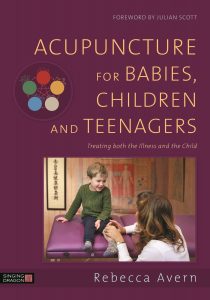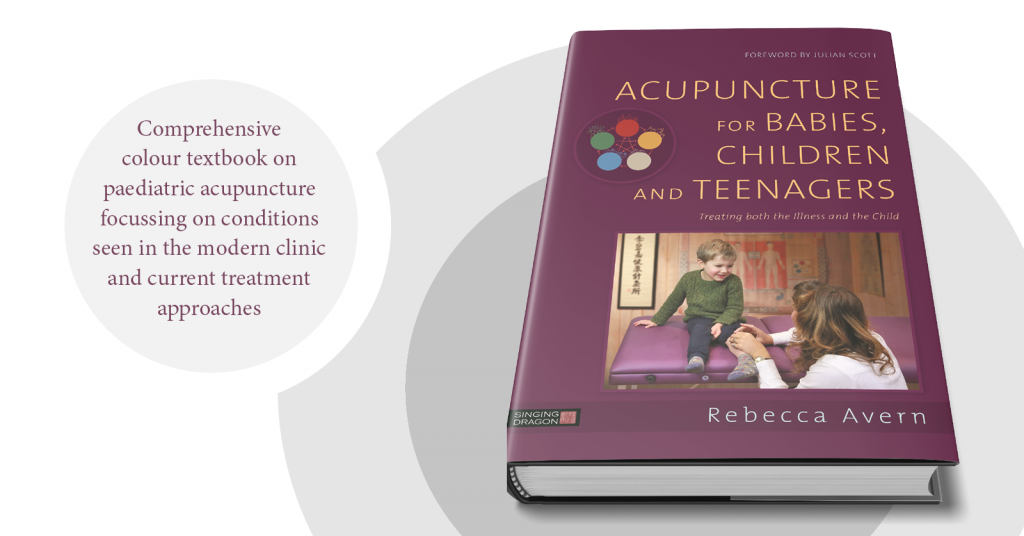Rebecca Avern is a traditional acupuncturist and founder of The Panda Clinic, a children’s acupuncture centre in Oxford. She is also a senior lecturer and clinical supervisor at the College of Integrated Medicine, Reading, UK. In this piece, the author of Acupuncture for Babies, Children and Teenagers discusses the values of acupuncture for children and the diverse range of conditions it can help treat.
Acupuncture is used all around the world to treat children. In the developing world, where antibiotics and vaccinations may not be available or affordable to many families, acupuncture may be used to help children through acute illnesses. Treatment during, for example, a severe febrile disease may reduce the chances of the child being left with significant morbidity, such as breathing problems or even paralysis. Some of my colleagues in the wonderful World Medicine charity (www.worldmedicine.org.uk) treat children hit by poverty, trauma and natural disasters all around the world. Acupuncture’s ability to treat both the body and the spirit means it is of great value to these children, who may have suffered huge amounts of trauma, as well as coping with enormous physical hardships.
In the developed world, improved living conditions and vaccinations mean that the incidence of potentially fatal diseases in childhood has vastly reduced. Yet these children are beleaguered by an altogether different array of chronic conditions: respiratory and food allergies, asthma, stomach aches, headaches, chronic fatigue syndrome, sleep disturbances and behavioural problems – to name but a few – have become modern-day epidemics. These conditions are rarely fatal but can have a profound effect on a child’s life. They detract from the carefree condition that should characterise childhood. Acupuncture is extremely well-suited to the treatment of these kinds of conditions, and more and more parents are becoming aware of this.
It is also encouraging that members of the orthodox medical profession have a growing awareness of how acupuncture can be a useful and effective tool in the treatment of children. In my clinic in the UK, children are referred to me by paediatricians from different specialities, for example urology, gastroenterology and allergy.
As well as treating specific symptoms, acupuncture is a wonderful treatment tool to support children as they develop. According to Chinese medicine theory, there are particular times in a child’s life (for example around the age of 7 or 8, and then again around the ages of 14 to 16) when there is an enormous amount of flux and change going on. These phases are both an opportunity and a challenge. If circumstances in a child’s life are good, she or he may throw off a health problem that has been around for years, such as eczema or asthma. On the other hand, if there are stressful factors in the child’s life at this time, a chronic illness may become more ‘set in’ and stay with the child until the next phase. Treatment during these crucial times can make the difference between illness going deeper or it being thrown off once and for all.
Contrary to what many believe, acupuncture is generally well-tolerated by children. When practised by a well-trained professional, it is safe, free from side effects and extremely powerful. One of the many benefits of acupuncture for children is that it can hugely reduce a child’s need for medication. Many childhood medicines, as well as being expensive, have strong side-effects and in some cases may even interfere with a child’s development.
Treating children with acupuncture, and thereby helping them to become healthier and happier beings, is the most satisfying work I can imagine. It is my hope and belief that awareness of acupuncture’s many benefits for children will continue to increase all over the world.
 Acupuncture for Babies, Children and Teenagers
Acupuncture for Babies, Children and Teenagers
Treating both the Illness and the Child
Rebecca Avern, illustrated by Sarah Hoyle
This colour textbook enables acupuncturists to diagnose and treat physical and emotional ailments in babies, children and teenagers. It draws on the author’s extensive clinical experience to provide solutions to a wide range of conditions including asthma, allergies, bedwetting, digestive issues, ADHD and depression.
